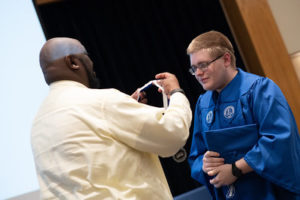Nearly every state has put renewed emphasis on ensuring that more adults get a college degree, with Indiana as a shining example. According to a report from the Indiana Commission for Higher Education, the achievement gap between low-income and other student populations in the Hoosier State has narrowed by more than half and is projected to close completely by 2025. Much of the credit for this turnaround is due to Indiana’s 21st Century Scholars program.
The program is a need-based, state-aid initiative that pays up to four years of undergraduate tuition at any participating public college or university or a comparable amount for a private college. To qualify, high school students must meet 12 requirements, including attaining a GPA of at least 2.5, refraining from illegal drug use, and earning a Core 40 diploma.
At Indiana State University (ISU), about one in five entering freshmen are 21st Century Scholars. While the award money is earmarked for tuition, ISU also provides other aid for these scholars, such as housing and book allowances. When the program began, aid was available regardless of a student’s progress in college. About five years ago, however, the program switched to a more demanding schedule where students have to reach 30, 60, and 90 credit goals.
“There’s an intensive level of effort where we work with 21st Century Scholars because we want them to reach those milestones,” says Josh Powers, associate vice president for student success at ISU. “We do tons of things to instill pride. We immediately signal that they’re 21st Century Scholars. We want to be relentless in helping them [get their degree].”
Before the school year begins, scholars are invited to a pinning ceremony that recognizes their status and makes them feel that they belong in college. Speakers include students who are themselves 21st Century Scholars; incoming scholars recite a pledge to commit to their education, sign a banner, and receive a 21st Century Scholar pin.
ISU also has a student-led Scholar Corps organization for support, as well as a mentoring program where first-generation college students are matched with first-generation faculty or staff members. Some faculty even post a sticker on their office door with a message such as I WAS A FIRST-GEN IN COLLEGE. ASK ME MY STORY. “I cannot tell you how quickly the barriers go down when you recognize that this professor in front of you was that in high school or college,” Powers says.
The 21st Century Scholars program certainly helps more students stay on track for a timely graduation and allows ISU to fulfill its mission. But, Powers says, ISU also benefits in very practical terms. For example, it provides an important resource flow to the school, gives ISU higher visibility, and gains the attention of the state legislature and education commission.
For institutions that want to help their low-income or disadvantaged student populations and fulfill their state’s higher education graduation goals, Powers offers these suggestions:
- Inclusiveness messaging. “It’s important to remind oneself that a student is not a monolith. It’s important to do some introspection about the messages you’re sending of belongingness and what you’re doing to meet them where they are.”
- Financial literacy. ISU hires financial aid specialists during the summer to work individually with families and work through their financial circumstances.
- Comprehensive support. ISU reinforces the message that asking for help is a sign of strength. For example, ISU has remedial math instruction so that students can get extra instruction and “really get down in the weeds and not feel uncomfortable that they’re going to be negatively viewed by the professor because they don’t understand something. It’s always a work in progress.”
- How we connect incoming students to the university resources they need - July 4, 2025
- AI and the workforce: Reskill to meet the moment - July 1, 2025
- Beyond the game: Why business expertise is the future of sports management - June 26, 2025
